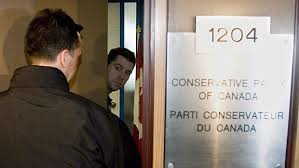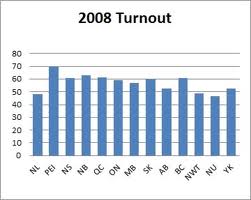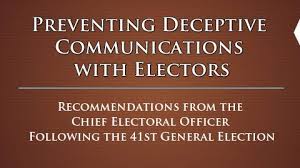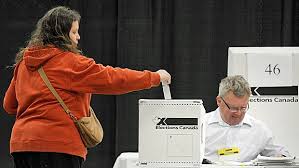March 26, 2014
BURLINGTON, ON.
If it ain’t broke don’t fix it. Canada is held up as a model for how to run elections – we are recognized as having the best electoral system anywhere – and 85% of Canadians also thought our last federal election was perfectly fair. So why has the government introduced their so-called ‘Fair Elections Act’? And why is this Bill getting panned/dumped on by just about everybody, including a national newspaper and some 150 political scientists around the world?
For one thing the process is flawed. Everyone knows that the PM has been engaging in a war with Elections Canada – ever since they nailed him on his party’s in-and-out funding scandal. Why would anyone expect him to be impartial? Shouldn’t something as important as changing our electoral process be managed by an independent body, rather than at the whim of one of the political parties? Why were there no consultations prior to introducing the Bill – not with the other political parties, not with the public and not even with Elections Canada, who might know a thing or two about elections?
Elections Canada’s mandate currently includes encouraging more people to vote. We understand that democracy works best when more citizens are involved. But this Bill would diminish that objective and further suppress voting by removing ‘vouching’, which was used without issue by thousands of voters in the last election. The government claims ‘vouching’is problematic, and there may be better ways to assist those without adequate ID to secure their right to the ballot box. But just excluding voters without adequate identification is throwing out the baby with the bath water. And, critics say the minister proposing this change is wrong – hasn’t done his homework.
Some nations, like Australia, legally require their citizens to vote; why would we want to do anything to suppress voting, to discourage people from exercising their franchise? If one wants to vote in Australia and isn’t carrying the right identification they can just swear an oath and declare their right to get a ballot. Further, shouldn’t we be finding more inclusive ways of voting, like internet voting to facilitate and enable more of our youth to participate in the democratic process? We do internet banking don’t we? Surely, we can manage the process of issuing secure ‘pin’numbers.
For a number of years Canada’s official political parties received direct public funding, the amount dependent on how well they had performed in the previous election. This reduced the influence of money, and the power of wealthy contributors, in shaping government policy. Germany, Sweden, Israel, Australia, Austria and Spain are among the growing number of countries with public funding, now representing over half of those with elected democracies. US presidential candidates may elect for public finding. And just to be clear, note that we subsidize political parties with the public purse anyway – through tax-deductible donations.
Mr. Harper, when leading his minority government, eliminated corporate and union funding and reduced the individual contribution limits to $1000, keeping his earlier election promise. And it was relatively easy for him since the Conservatives are more effective at attracting individual donations than the other parties. Then, after gaining his majority, he cancelled the public funding program to solidify his private funding advantage. And the new Bill would raise that individual donation limit by a whacking 50%. The Bill, for some bizarre reason the government has difficulty explaining, also exempts political parties from spending limits for fund-raising activities.
For something labelled Fair Elections Act, the Bill fails to improve fairness in any meaningful way, such as giving Elections Canada the power to investigate political parties and compel testimony of those suspected of committing transgressions. This limitation came to light with the Robocalls scandal, in which the Tories were also implicated. To make it even more difficult for irregularities to be uncovered and those guilty penalized, the Bill shifts that responsibility to a partisan minister (attorney general), and muzzles the politically impartial Elections Canada which reports to Parliament as a whole.
And wouldn’t something called Fair Elections deal with the unfairness of the first-past-the-post (FPP) system in our problematic multi-party environment – one that enables a PM winning less than 40% of the popular vote to rule the country at his/her pleasure for a full unfettered four years. New Zealand, Germany and a host of other nations use a proportional electoral system, where some of the MPs are chosen FPP and the others appointed by the relevant political parties based on their share of the popular vote. The results for these nations have been generally positive with less violent swings in public policy.
 The Green Party and NDP are big supporters of proportional representation. The Liberals are promoting a preferential system that would ensure future governments are elected by at least half the voters. Toronto city voters may use a similar system in this year’s mayoral election. Voters would rank candidates, and the second and third choices of the lowest scoring candidates would get added to the highest scoring candidates’tallies – until one has emerged with over 50% support.
The Green Party and NDP are big supporters of proportional representation. The Liberals are promoting a preferential system that would ensure future governments are elected by at least half the voters. Toronto city voters may use a similar system in this year’s mayoral election. Voters would rank candidates, and the second and third choices of the lowest scoring candidates would get added to the highest scoring candidates’tallies – until one has emerged with over 50% support.
In the end, democracy is about representing the public will. It is unfair to be subjected to the ideological whims of a political party, be it right or left-wing, which came to power with the support of less than half of the electors, let alone 38%. Fixing that irregularly would be a worthwhile endeavour. Otherwise, calling this Bill the ‘Fair Elections Act’is a huge misnomer. It is nothing more than a crude attempt to break and handicap what seems to be working just fine.
Background links:
Fair Elections Act Elections Canada Implications More Implications Ranked Voting Conservatives Muzzling
Elections Act Critics NDP Tour on Elections Act Kill This Bill Government Strikes Back Voter Fraud Real Problems
























The problem with proportional representation schemes, as I have said before, is that they allow fringe parties and/or candidates an opportunity to have more influence for their pet peeves than they would otherwise get. Take a look at the government of Israel, as an example. Consider such a scheme playing into the hands of a revitalized Bloc Quebecoise. Do we really want to give more power to a party that wants to try to destroy the country? There may be problems with our current system, but PR will not prove to be the panacea people think it is.
I love this chestnut about the Conservatives governing with less than 40% of the popular vote. There have been only 4 times in Canadian history since 1940 when the party that won the election gained 50% or more of the popular vote: McKenzie King (Lib) in 1940, Louis St. Laurent (Lib)in 1949,John Diefenbaker (PC)in 1958, and Brian Mulroney (PC) in 1988. For all the other elections, except those 4, the governing party garnered less than 50% and even less than 40%. In his second term, Chretien only got 38%. Funny how we never heard about the unfairness that his government formed with those kinds of numbers. We only hear about it with the much despised Mr. Harper.
Mr. Rivers will tell you that Pierre Elliot Trudeau is Canada’s greatest Prime Minister. Well, he told me that, at any rate. These are his numbers in 3 elections, including his wildly press-endorsed rise in 1968: 48%, 41% and 45%.To pick up the popular meme, more people voted against his government than voted for it. If we’d had proportional representation back then one wonders whether he would have made the “Greatest List”.
I confess that I have not followed this election bill with as much attention as I probably should have, but I noticed that Mr. Rivers raised the demise of the “vouching system” as being a big problem. Do we have any evidence that tells us how many people usually show up to vote and have to be vouched for? I haven’t seen them, but perhaps some kind reader would give us the statistics, if they are available. Otherwise I am left thinking this is one of those molehills being made into a mountain.
Finally, I agree that Internet voting can raise all sorts of problems even though it seems convenient; not the least of which, as we well know, it is not secure. I would opt, instead, for a voter identification card, with photo and perhaps biometric information that can be scanned at the polling station. It would be more expensive, but I think it would go a long way to virtually eliminating voter fraud. I am of the view that those who want to participate in our democratic elections will ensure that they go to an appropriate government service centre to obtain such a card, and those who don’t won’t and why should we concern ourselves with them? After all, we get unique social insurance numbers (which we have for life), we get unique passports, and is there anybody who wants to drive a vehicle or have their health care covered who won’t make the effort to go to a Service Ontario office and get the relevant pieces of plastic? How difficult can it be to extend that mindset to a unique voter ID card?
Gary – thanks for your comments – they are always welcome. According to Harry Neufield, author of the 2013 repot for Elections Canada (which the minister has used as his reference)…”The Fair Elections Act would kill both vouching and the use of the voter information card (VIC), which Mr. Neufeld said 400,000 people used to verify their address in 2011. All told, he said, the vouching and VIC changes affect roughly 520,000 people, and he estimated half of those – 250,000 people – wouldn’t be able to vote.”
Ray
Well researched and reported article Ray. I agree this bill has little to do with “fair” elections and I wince every time I see the Minister I charge rise in the House of Commons to defend it. Shallowness at its best.
I too long for the day when some sort of proportional representation is brought in at both federal and provincial levels.
Susan beat me to posting my thoughts in internet voting. Having volunteered in several elections I have experienced many cases of voters clearly not wanting their spouse / significant other to know how they plan to vote. The secret ballot protects this. It is critical to the integrity of our voting system that NOBODY except the voter knows how they truly voted (unless they want it to be known).
As soon as your spouse / father / mother / brother / cousin can stand behind you and watch how you vote in the privacy of your home we lose that integrity. Furthermore votes can now be sold in essence.
Then there’s the guy who told me in Burlington’s last municipal election he voted 3 times – once for himself and twice more for his kids away at University whose voting cards showed up at their Burlington home. Maybe he was joking I can’t be sure. But the possibility for this abuse exists.
Internet voting is not a panacea and it does very little to solve the issues of lack of concern in the political process as a whole. There are many great possibilities for using technology to enhance community discussion, that are just not being used by most of our leaders. The last ward public meeting I attended had a grand total of 8 (!) people in attendance. That is truly pathetic. Obviously we need to try something different to get people engaged.
Other than that I agree with the points made in the article. The ‘Fair Elections Act’ is shameful, bully-like behaviour by a party who sees their slim electoral advantage slipping away from them.
Excellent article. You called it like it is and you did not refer to the current Federal Government as P.C. It’s the C.P.C., the Conservative Party of Canada, not the Progressive Conservative Party we are most familiar with. They are the Reform/Alliance Party renamed. It’s amazing what changing your name can do.
I agree with most of what you said except the idea of internet voting. Personally I’m not all that comfortable with internet voting:
– Can the results be tampered with by a hacker?
– There is no one watching the voters and the process to be sure things are done aboveboard.
– In some homes, violence rules. The aggressor just takes away the votes of the spouse and voting age children thereby taking away their right to vote the way they want. Currently, no one is allowed in the voting booth with you, that would change with internet voting.
Thank you for your comments – those are valid concerns indeed respecting the potential of internet voting.
Ray
I agree with your editorial and am glad to see that the issue of Proportional Representation appears in the media on a more regular basis. Even Andrew Coyne has been espousing its merits lately.
Until such time as we have some kind of PR system in Canada/Ontario, it is the one issue on which I base my vote, every time.